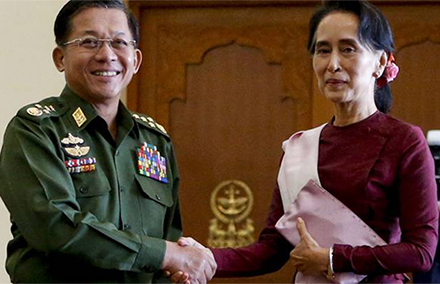
Min Aung Hlaing shakes hands with Aung San Suu Kyi.
To change the constitution, Myanmar’s champion of democracy must win over former military masters.
In the wake of Myanmar’s November 2015 election, which saw Aung San Suu Kyi’s National League for Democracy win in a landslide, the country’s top general had some important words.
Senior General Min Aung Hlaing told The Washington Post, “People have selected a person who they think can fulfill their needs… the next thing is for the elected person to fulfill their desires.”
It’s against this background that Aung San Suu Kyi’s recent meetings with Min Aung Hlaing, former General Than Shwe, and current President Thein Sein can be viewed as some of the most crucial developments in Myanmar’s transition to democracy. These meetings are, for the future of democracy, as important as the triumphant election results. They also suggest how authoritarianism is coming to an end after decades of military rule.
Currently, Suu Kyi is constitutionally barred from the presidency although her NLD party won a majority in the elections. Undeterred, she has come up with a novel solution to the dilemma; posting a puppet president who will follow her every word.
Many scholars, especially from the West, were not in favour of Suu Kyi’s method, although her supporters remained understanding and were grateful for her honesty. Less understandable is why Suu Kyi explicitly made such a plan public while she could have done so unannounced.
One reason was to openly defy those currently in power and the barriers they have set up to prevent her from becoming the head of state. Nonetheless, this “above the president” plan never seemed to be the most appealing solution for Suu Kyi’s shot at the presidency.
That is why Suu Kyi’s meetings with President Thein Sein, Min Aung Hlaing, and the Than Shwe, will play a significant role in her path to the presidential office. If Suu Kyi wants to use the parliament to amend a constitution that restricts her from the presidency, it will come down to a numbers game.
In the parliament she either needs 75 per cent of all MPs and one per cent of the military, or a combined total of 76 per cent of MPs and military officials to support any proposed constitutional change. It’s no easy task, particularly when power is confusingly divided in the current parliament, and where her party holds only minor posts.
As such, Suu Kyi has to carefully and cleverly forge alliances.
Her strategy to meet with Min Aung Hlaing and Than Shwe is smart and symbolic. Regardless of whose side members from their Union Solidarity and Development Party are on, the two generals could shuffle the opinions positively in Su Kyi’s favour. With the support of these two generals, Suu Kyi could earn more than the required one per cent approval from military officials in the parliament to amend the constitution.
What is more significant was when Than Shwe made the public announcement approving Suu Kyi as a desirable leader for Myanmar’s transition to democracy.
The meeting between Suu Kyi and Than Shwe lasted two-and-a-half hours. Compared to her meetings with Thein Sein, which lasted approximately 45 minutes, and with Min Aung Hlaing, which lasted one hour, this suggests how serious the conversation was. With these two generals in her bag, Suu Kyi can now effectively promote her proposal to current MPs who are still working under the informal mandate and loyalty of Than Shwe or Min Aung Hlaing.
However, one factor will possibly barricade her efforts to amend the constitution. President Thein Sein seems very reluctant to approve her victory and attempts to gain power as the president. This was vividly apparent when the President’s Office announced they did not have prior knowledge of Suu Kyi’s meeting with Than Shwe.
These small conflicts portray how power is distributed in the current incumbency. The USDP is divided between Thein Sein and Thura Shwe Mann, since they have differing visions on overseeing the transition. Than Shwe is heavily respected by his former followers, but he has settled on being a bystander.
Although the military helped Thein Sein remove Thura Shwe Mann in the past, this does not necessarily raise the option of a military coup to dethrone Thein Sein. The military has publicly confirmed an intent to step away from resolving election matters in any arena besides parliament.
Furthermore, Than Shwe’s recognition of Suu Kyi as a worthy leader may somewhat confirm a wider stance that the military wants to establish in the political sphere. This may mean that it is just a matter of time before Suu Kyi can amend the constitution and become president.
The military does not bear any disadvantage by letting Suu Kyi become president. They will still maintain their 25 per cent rule in parliament, and Suu Kyi is very unlikely to contest military power, at least not in the near future.
If this is the case, Suu Kyi’s trial meetings with these three leaders in power will prove the most significant recent development in Myanmar’s transition to democracy.
Hnin Wint Naing is a postgraduate student from Myanmar reading a Master of Global Governance and Diplomacy at Oxford University’s Department of International Development. Her current research focuses on how authoritarian attitudes among elites and civil society stall democratic transition and possibly cause its reversal, particularly in Southeast Asia.
 Facebook
Facebook  Twitter
Twitter  Soundcloud
Soundcloud  Youtube
Youtube  Rss
Rss 